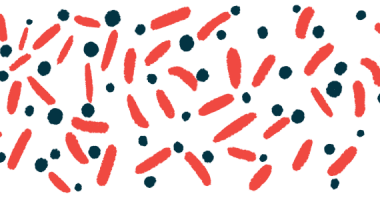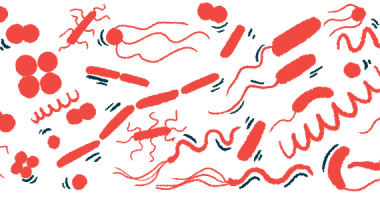In a First, Bacteriophages Eliminate Treatment-resistant Lung Infection

For the first time, bacteriophages — viruses that kill bacteria — eliminated an antibiotic-resistant mycobacterial lung infection in a man with advanced cystic fibrosis (CF) lung disease, a study reported.
As a result, the patient was able to undergo a successful lung transplant after one year of bacteriophage treatment.
“I am so grateful for the effort, persistence and creativity of all the people who were involved in my treatment,” Jarrod Johnson, the recipient of the lung transplant, said in a press release. “I thought I was going to die. They have literally saved my life.”
Added Jerry Nick, MD, study lead and director of the adult CF program at National Jewish Health in Colorado: “This research can serve as a road map for future use of phages to treat patients with severe Mycobacterium abscessus lung infection and to save lives.”
The study, “Host and pathogen response to bacteriophage engineered against Mycobacterium abscessus lung infection,” was published in Cell.
The buildup of thick mucus in the lungs is a hallmark of CF, which can lead to recurrent and damaging bacterial infections and eventually lung failure, requiring transplant.
Mycobacteria are a common type of bacteria that can cause tuberculosis, leprosy, and non-tuberculous mycobacterial (NTM) infections. They can be aggressive and difficult to treat, even with combinations of multiple antibiotics over long periods.
Johnson is a 26-year-old man with CF who experienced repeated lung infections throughout childhood and, as a result, was admitted to hospitals several times a year. As an adult, his lung function rapidly declined due to persistent infection by Mycobacterium abscessus, which did not respond to antibiotic treatment. It recently dropped below 30% and he needed a transplant.
However, due to the ongoing mycobacteria infection, which had spread to his skin and other tissues, and the lack of effective treatments, he was unable to undergo the procedure.
Bacteriophages, or phages, are viruses that selectively target and kill bacteria. There has been a growing interest in using phages to treat antibiotic-resistant bacterial infections in recent years. To date, phages have not been used to treat a mycobacterial infection of the lungs.
In this report, Nick and colleagues describe how Johnson’s mycobacteria infection was eradicated by phage therapy, which allowed him to undergo a lung transplant.
“We had tried unsuccessfully for years to clear the mycobacterial infection with a variety of antibiotics,” Nick said. “When we used the bacteria’s own natural enemies, we were able to clear the infection which resulted in a successful lung transplant.”
Sputum samples were collected from Johnson, M. abscessus was grown in culture, then screened against a panel of phages, which were genetically engineered to improve their bacteria-killing potential. Two specific phages were identified that efficiently killed the bacteria, either alone or in combination, over a wide range of phage and bacterial levels.
While he was in the hospital for an acute worsening of his symptoms, the therapeutic phage cocktail was infused into Johnson’s bloodstream twice daily. It was well tolerated, with no reported side effects. He was discharged five days later and continued on two phage treatments a day.
Johnson was readmitted to the hospital four times in the year after starting phage therapy because of pulmonary exacerbations. Sputum samples were collected for up to a year, which were largely positive for M. abscessus to day 96 (about three months). However, most of the following cultures were negative for up to one year. At around three months, he began CF treatment with Trikafta.
Although his lung function ranged from 23% to 31% over the year following phage therapy, similar to before treatment, his time in the hospital decreased. Based on the absence of M. abscessus infection, he was listed for a lung transplant one year after phage therapy and underwent a successful transplant soon after, in October 2021. Phage therapy continued throughout his recovery for up to 500 days (about 16 months).
CT scans of his lung during phage therapy showed some improvements over time, along with markers for M. abscessus death. There was no evidence of resistance to phage therapy.
All M. abscessus samples isolated over the course of his infection were tested against 20 antibiotics, most of which were consistently resistant or demonstrated little variability, “suggesting the combination of phage and antibiotics did not result in greater antibiotic resistance,” the researchers wrote.
Lastly, because phage treatment can fail due to the emergence of anti-phage antibodies, his blood was collected and tested. Surprisingly, Johnson had a substantial antibody response to both phages even before treatment, suggesting that “this individual had naturally encountered phages,” the researchers noted.
Antibody levels increased modestly in post-treatment blood samples, but he did not mount a substantial additional antibody response to one of the phages until late in the treatment regimen. At that point, sputum cultures were primarily negative for M. abscessus.
“The use of phages in very advanced lung disease with the objective to sufficiently control M. abscessus as a bridge to lung transplant may be considered based on this report,” the researchers wrote.
The Cystic Fibrosis Foundation and the National Institutes of Health provided funding for the treatment and study.








